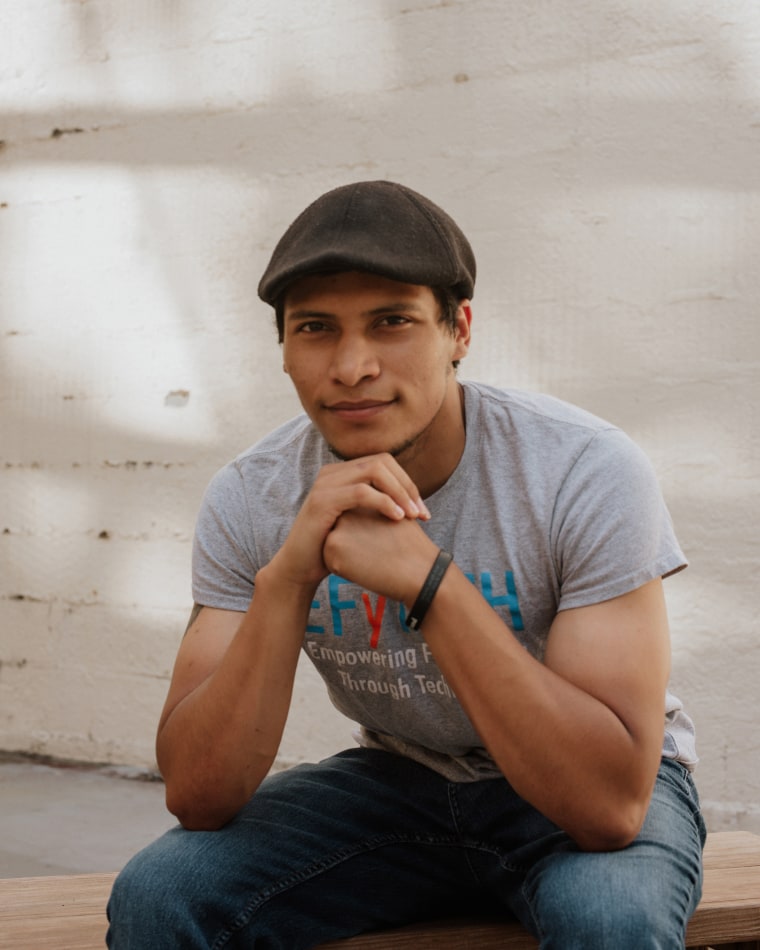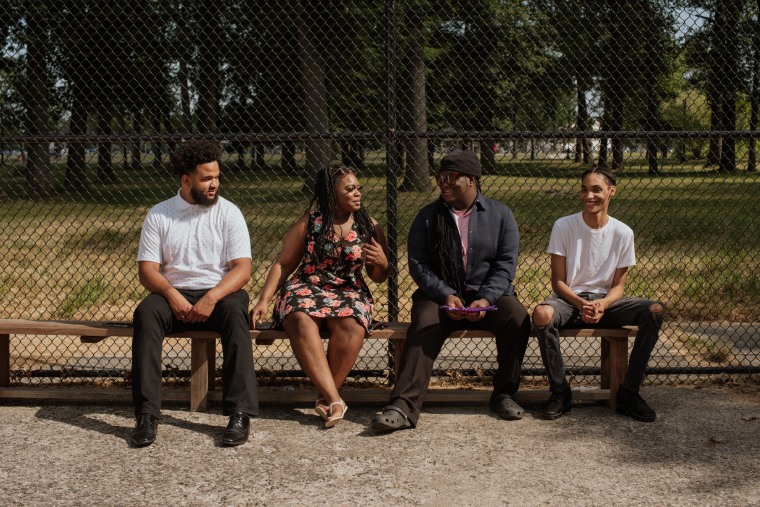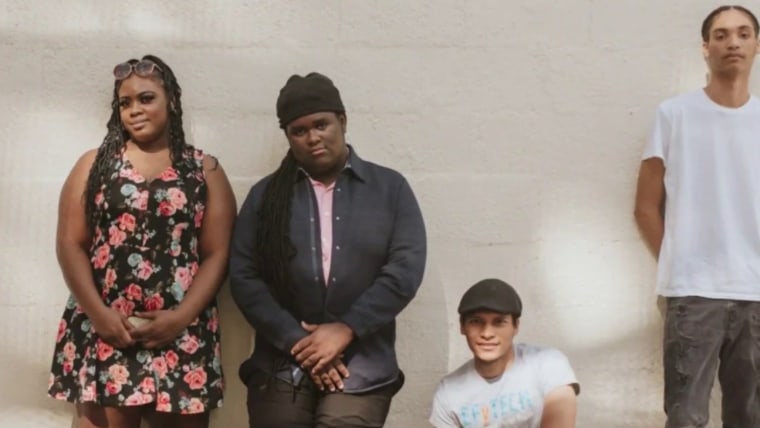DETROIT — Michigan is catastrophically failing to offer lots of the most weak youngsters in its care with a top quality schooling, delaying some youngsters’ commencement by years or leaving them so pissed off that they drop out of faculty, in response to foster youth, their advocates and educators who’ve tried to assist them.
NBC Information spoke with 10 present or former Michigan foster youth who collectively frolicked in additional than a dozen residential services lately, both as a result of social staff couldn’t discover a household to take them or as a result of the state stated they wanted remedy for psychological well being or substance misuse points.
All of them attended courses for months or years with different younger residents of these services.
All of them had been assigned schoolwork and accomplished it, they stated.
Some thought they’d acquired high quality instruction from caring lecturers. Others recalled being largely parked in entrance of computer systems or handed packets of worksheets.
However all of them realized a tough lesson after they moved out of those services and tried to switch to a public faculty: The courses they took within the state-funded, state-licensed establishments didn’t essentially depend towards commencement.
“They stated I had no credit so I needed to begin over,” stated Kayla Goshay, 23, who realized at 18 that the courses she took throughout two years in a house for women weren’t mirrored on her transcript. She suspected the programs weren’t nice — women ages 12 to 17 had been all taking the identical on-line courses on the identical time, she stated — however she was informed she was working towards a diploma.
“I used to be shocked,” she stated. “I used to be damage and irritated as a result of I assumed I used to be doing one thing and I actually wasn’t doing something.”

Youngsters in foster care face a few of the nation’s steepest obstacles to commencement, with solely about 54% incomes a diploma or GED certificates by age 19, in comparison with about 86% of public highschool college students total.
Foster youth positioned in establishments — a bunch that is disproportionately Black and Latino — face even longer odds, specialists say, since they’re extra more likely to have unmet social and emotional wants, and so they’re much less more likely to have foster mother and father to talk up for them.
Their issues are compounded in states like Michigan, the place the kid welfare system and schooling officers pay little consideration to the instruction services present and have failed to make sure that services adjust to legal guidelines requiring the well timed switch of educational information, educators and foster care advocates say.
“These are youngsters who haven’t performed something to deserve what’s occurred to them,” stated state Rep. Stephanie A. Younger, a Democrat from Detroit who serves on the Legislature’s little one welfare and foster care process forces. “As an alternative of actually assist put together them, actually assist equip them, we’re giving them the quick finish of the follow insufficient schooling.”
Michigan’s little one welfare and schooling companies say they don’t have any technique to comprehensively or systematically oversee the standard of schooling supplied in services. The contracts the state has with 58 establishments require them to offer youngsters with “applicable instructional providers” however depart the definition of “applicable” as much as the businesses or organizations that run them. Meaning the services strategy schooling in several methods, with some sending college students to close by public colleges and others working on-campus colleges which might be overseen by a neighborhood district or run as a constitution faculty or non-public academy. The non-public colleges are largely past the attain of presidency oversight.
And lots of the packages — each private and non-private — are clearly not assembly college students’ wants.
“I felt destroyed. I felt like every little thing I did was for nothing,” stated Christian Randle, 17, who has spent the previous yr making an attempt to get credit score for the ninth and tenth grade courses he took in a mixture of private and non-private colleges whereas residing in residential services.
Randle has grow to be so pissed off seeing his exhausting work “swept away” that he determined final month to surrender on a diploma and is now pursuing a GED certificates, he stated. He’s a part of a bunch of youth in Michigan who’re pushing the state to deal with the problem.
“They take us away from our mother and father for issues that they’re not doing, however then y’all not doing the belongings you’re presupposed to do,” he stated of state officers. “Who’s going to take us from you?”

‘They grow to be hopeless’
Most of the foster youth advocating for modifications in Michigan say they’re not totally certain why they didn’t get credit score for the courses they took.
Some suspect the instruction they acquired was beneath grade stage.
“She was educating us like fifth grade math, like occasions tables,” stated Raymond Miller, 19, of courses he took within the tenth grade in a Detroit facility that he by no means obtained credit score for.
Some described their colleges as chaotic.
“We most likely had a brand new trainer each two weeks,” stated Renard Baldwin, 20, of the courses he took in a unique Detroit facility. “The residents would all the time run off the lecturers. They might stop.”
Some stated they couldn’t full their courses as a result of the state moved them midsemester. Others stated they completed their courses solely to find that their credit had evaporated within the bureaucratic haze of the kid welfare system.
“To this present day, we’re nonetheless struggling, with assist from attorneys, to search out any supply of transcript from any faculty I’ve been to since I’ve been in foster care,” Randle stated, referring to varsities he attended since he was 12. “They don’t have one transcript for me — actually not one.”
When college students do get their transcripts, they usually uncover that they took the unsuitable courses, stated Chuck Fabbro, the principal of a faculty on the grounds of a remedy facility run by Wolverine Human Providers in Vassar, Michigan.
“The largest subject I see with different packages is that they don’t check out what the scholar wants and simply put them in courses,” Fabbro stated. “They’ll put you in Earth science twice.”
Fabbro, whose faculty is overseen by its native faculty district and serves each foster youth and kids within the juvenile justice system, estimated that greater than 10% of scholars who arrive from different residential services have a problem with their credit. They might have thought they took ninth grade math when in actuality they had been in a remedial course that doesn’t meet ninth grade necessities, he stated.
“They grow to be hopeless,” he stated. “They suppose they’re near graduating. We get them this near the top of the street after which we now have to have powerful conversations.”

These conversations can result in college students dropping out.
“I used to be too irritated to do something,” stated a 19-year-old who lived in six residential services after getting into foster care at age 10 and spoke on the situation that his identify not be printed out of concern for his privateness. He left faculty a yr in the past, not sure when he’ll return. “I put all this time in to ensure I obtained a highschool diploma, so for me to get pushed out and informed, ‘You’re not even near ending,’ I’m irritated as crap.”
Christopher Jaco, 20, selected to remain in class — however at a value.
Jaco, who was 6 when he entered the system, spent his early teenagers clashing with employees in residential services. He’s a towering Black man — 6 ft, 9 inches tall — who believes that facility employees had been afraid of him. They stored placing him on psychiatric treatment that he didn’t suppose he wanted and punishing him when he refused to take it, he stated. He stored operating away, and the state stored shifting him, he stated, biking him via six or seven residential services together with a juvenile detention middle.
By the point he moved into an impartial residing group house at 16, the Detroit constitution faculty the place he enrolled may barely discover any accomplished credit on his transcript, a faculty administrator recalled. He was informed he’d have to begin as a ninth grader — a blow to his plans of graduating on time.
However Jaco was decided. He has formidable desires of proudly owning a big profitable enterprise — perhaps a trucking or actual property firm — and beginning a nonprofit group to assist the following technology of foster youth. He buckled down, waking up at 4 a.m. day-after-day to work out, then spending 10 or 11 hours in school to cram 4 years of faculty into two years — all whereas taking part in on his highschool basketball staff, operating a small enterprise promoting lanyards and discovering time to purchase groceries and prepare dinner for himself, he stated.
He’s now a school sophomore majoring in enterprise and communications, however he resents the sacrifices he needed to make.
“It’s not like my household may assist or step in and help with my studying scenario,” he stated. “It falls again on the state. That they had custody of me. They’re presupposed to ensure that I’m certain to achieve success and certain to go to school.”

‘Simply go repair it’
State officers in Michigan say there’s not a lot they will do to ensure that youth of their care are incomes credit towards a diploma as a result of commencement selections are made by particular person districts — not by the state.
Whereas all public colleges use the Michigan Advantage Curriculum, which spells out what number of credit college students want in every topic to graduate, the state’s greater than 800 districts and constitution colleges every set their very own requirements for what constitutes a credit score — and whether or not to simply accept switch credit from different colleges.
Meaning the state can’t require that the credit college students earn in residential services depend in one other faculty, stated Rachel Willis, the director of out of house providers for the state’s Division of Well being and Human Providers.
“MDHHS can require that youth in child-caring establishments obtain an schooling,” she stated in a press release, “however can’t require the credit be picked up by the following faculty as a result of that’s a choice made by particular person faculty districts and colleges.”
The state doesn’t preserve monitor of how services educate the youth of their care, Willis stated. Her company denied a public information request searching for details about schooling in services, saying it “doesn’t have documentation on the standard of instruction and/or instructional outcomes.”
As an alternative, social staff and attorneys within the system ought to guarantee the kids on their caseload get an schooling, Willis stated. If a baby isn’t making progress, their employee ought to intervene, she stated.
Since listening to from Michigan foster youth about instructional points, the company has met with services and schooling officers to higher perceive the issue, a spokesman stated.
The state Schooling Division equally says there’s not a lot it might probably do about schooling in services since colleges are largely overseen by native authorities.
Exterior of the foster care system, Ruth Anne Hodges, the supervisor of the Michigan Division of Schooling’s schooling experiences unit, stated her division ceaselessly fields calls from mother and father who moved their youngsters from one district to a different and are having points with credit transferring. The state often tells these districts that they need to enable college students to check out of a course they’ve already taken.
“You possibly can’t simply categorically deny anyone’s credit score with out permitting them the prospect to show they’re proficient within the content material,” she stated. “By legislation, they’ve to permit the youngsters to check out.”
However foster youth could not have anybody on their advocacy staff who is aware of which courses they’ve accomplished or the best way to show it.
Judith New, an schooling lawyer who represents foster youth in Detroit and surrounding areas, stated she’s suggested shoppers for years to do no matter is required to graduate.
“If it’s a must to return and repeat a few of these courses, you already know, simply return and do them,” she recalled saying. “Suck it up and do them.”
It wasn’t till just lately that she realized the issue was systemic. She’s amongst advocates now calling on the state to do a greater job of overseeing the schooling foster youth obtain.
“Simply go repair it. It could actually’t be that tough,” stated Lynda McGhee, an government director with the Michigan Youngsters’s Legislation Middle, who says issues with credit transferring are “extra widespread than not” when foster youth depart services.
“We took them from their houses and stated we may do a greater job of elevating them,” McGhee stated. “We’ve got foster youth who wish to graduate and may’t as a result of the system that was supposed to guard them and handle them failed them.”
Advocates for foster youth say one of the simplest ways to make sure children get a top quality schooling is to keep away from putting them in services within the first place, permitting them to stick with foster households of their native public colleges.
That’s one thing the state has been prioritizing just lately, particularly following the 2020 dying of Cornelius Frederick, 16, who died after being restrained at Lakeside Academy, a now-shuttered youth facility in Kalamazoo. In response to Cornelius’ dying and a newly carried out federal legislation that requires states to position foster youth in establishments solely when psychological well being professionals deem it vital, the state has shifted the place youth are housed. Of greater than 10,000 youth who had been in foster care in Might, simply 380 had been in services, down from 1,171 in March 2020.
‘Final on the listing’
Youngsters residing in services are sometimes far behind academically and wish intensive assist. However many don’t get that educational assist, stated Sarah Fathallah, vp for analysis and design at Consider Us, a nationwide analysis and advocacy group.
After interviewing 37 foster youths from 30 states, the group discovered that almost all of those that attended colleges in establishments reported getting poor-quality instruction, usually in multigrade school rooms with minimal assets and ill-prepared lecturers, Fathallah stated.

Academic points in these services usually don’t get a lot consideration, as a result of the services additionally face pressing challenges in hiring certified employees and managing tense conditions, stated Shereen White, the director of advocacy and coverage for Youngsters’s Rights, a nationwide civil rights group.
“Individuals are so centered on holding the place from exploding on the within and so they’re so centered on all the risks that we all know are related to institutionalizing youth that the schooling is subpar or final on the listing or they don’t deal with it,” White stated.
Individuals who run residential services in Michigan say they’re doing their finest to assist youngsters in disaster. The youth they serve usually have important psychological well being and educational wants that will not have been clearly documented as college students had been moved from faculty to high school.
Kevin Roach, the CEO of MCHS Household of Providers, which runs a century-old house for boys in Redford, Michigan — the place Randle stated he spent months filling out worksheets in a multiage classroom — famous in a press release that research present college students lose an estimated 4 to 6 months of educational progress each time they change colleges.
“MCHS advocates to make sure all of our younger folks obtain the tutorial providers and the helps they should thrive,” he stated.
Susan Rosas, the president and CEO of Holy Cross Providers, whose group runs three services together with the one the place Goshay stated she accomplished coursework in a multiage classroom for which she by no means obtained credit score, stated in a press release that youth come and go from her services based mostly on their remedy wants — not educational ones. Meaning they depart credit unfinished.
Her group sends transcripts when college students transfer on, she stated, however, till final yr, it had no devoted funding for “longer-term case administration and advocacy tasks.”
“It’s unreasonable to count on a baby to navigate such difficult schooling techniques,” on their very own, Rosas stated, including that nobody is presently offering the assist and advocacy foster youth want.
The Detroit Behavioral Institute, the place Baldwin stated he had a rotating solid of lecturers from the affiliated Capstone Academy, is shutting down. The state suspended the institute’s license for a minimum of 5 years as of July 8, after discovering that youngsters there have been mistreated and the ability was unsafe, a spokesman for the state well being and human providers company stated.
A girl who answered the telephone on the Detroit Behavioral Institute declined to remark. Representatives from Capstone, which operates two different colleges in Detroit, didn’t reply to requests for remark.
The varsity the place Miller was enrolled when he stated he did fifth grade work as a tenth grader was a constitution faculty referred to as ACE Academy. Final yr, ACE was shut down by its authorizer, Central Michigan College, resulting from “vital points with their particular schooling providers,” a spokeswoman stated. Edtec Central, ACE’s administration firm, didn’t reply to requests for remark.
Wolverine Human Providers, which runs the ability the place Miller lived in Detroit, had a longtime partnership with ACE that ended when the varsity closed. Since then, Paul Whitney, Wolverine’s vp for residential packages, stated the ability has been sending youth to different Detroit constitution colleges however isn’t in a position to vet the standard of instruction.
“We advocate for our children to complete these packages and obtain the schooling,” he stated. “It’s form of exhausting for us to faucet into the constitution academies themselves to guarantee that they’re getting the precise courses. That will be a tricky promote for us.”
‘Put the youngsters in actual faculty’
The marketing campaign to deal with schooling points emerged final summer season amongst youth collaborating in a summer season jobs program with Empowering Foster Youth By Know-how, or EFyTECH.
Members of the group every needed to identify a private objective, stated Saba Gebrai, this system director for the Park West Basis, which helps foster youth as they age out of the system and helps EFyTECH.
Randle introduced that he wished to take twin enrollment programs, which let college students earn faculty credit whereas nonetheless in highschool, so he may start engaged on his profession objectives, which have included changing into a choose, a therapist or an engineer.
However when his lacking transcripts put twin enrollment courses out of attain, he and his buddies got here up with a unique objective: righting a unsuitable. Gebrai helped them arrange a sequence of conferences this yr with state lawmakers and state schooling and little one welfare officers.
Their emotional tales took the officers unexpectedly.
“This has positively been very enlightening for me,” stated Tracey Silas, a deputy director on the Michigan Division of Well being and Human Providers, in response to a recording of an April assembly. “A number of the circumstances that you just all shared are very traumatic, and I can see how that definitely was not an expertise we might need our younger folks to need to have going ahead, and we as a division actually need to do a greater job at guaranteeing that these items don’t occur sooner or later.”
Younger, the state consultant, has been working with the youth to craft laws that would result in higher state oversight and maintain establishments accountable. “These folks receives a commission some huge cash to handle these infants,” she stated. “There must be an accredited schooling constructed into these facilities.”
Michigan doesn’t have a proper accreditation course of for public or non-public colleges, however Younger stated there are different methods to require that foster youth are working towards a diploma. The state pays services about $250 to $900 per little one per day relying on the extent of service they supply.

The youth are calling for different modifications as properly, together with a legislation that might require services to offer college students with their transcripts on the day they transfer out. They need coverage modifications barring the foster care system from shifting youngsters with out confirming that they’ll have the ability to end the coursework they’ve began. And so they need the state to revise its contracts with services to outline “applicable” schooling as coursework that meets the commencement necessities of the Michigan Advantage Curriculum, that means remedial programs, job coaching and GED packages wouldn’t suffice.
These modifications are essential, stated Goshay, the 23-year-old who realized at 18 that the 2 years of courses she attended in a residential placement didn’t depend.
For Goshay, the devastating affect of the foster care system has gone far past schooling. Her youthful brother, Cornelius, was the 16-year-old who died after being restrained in Kalamazoo. The ache of that loss hit Goshay simply as she was growing older out of the system.
By then, she had lastly begun to place the difficulties of her childhood behind her, she stated. She’d returned to high school after initially dropping out when she realized she’d need to repeat two grades. She’d earned a diploma and had grow to be a licensed nursing assistant. However her brother’s dying “made it tough for me to stay my life,” she stated. “I nonetheless really feel misplaced.”
She resents the additional burdens she’s needed to bear — and referred to as on the state to do higher, not solely in defending the lives of youngsters like her brother but additionally in ensuring they will get the schooling they deserve.
“They need to put the youngsters in actual faculty,” she stated. “Like an actual highschool with actual folks and actual work and actual credit, so as soon as they get performed with being in a placement and so they go on with their life, they’ll know they’ve obtained a highschool diploma.”

